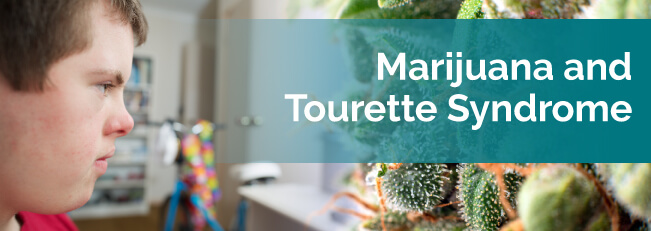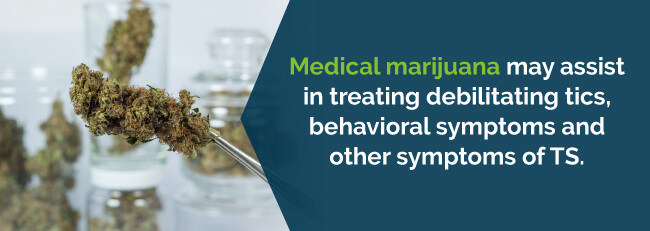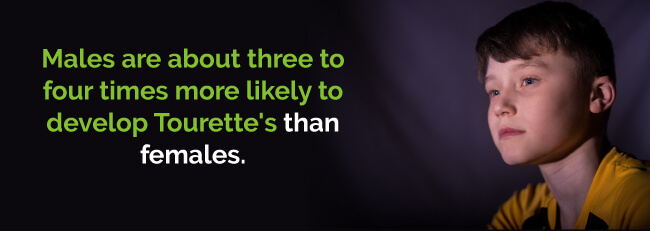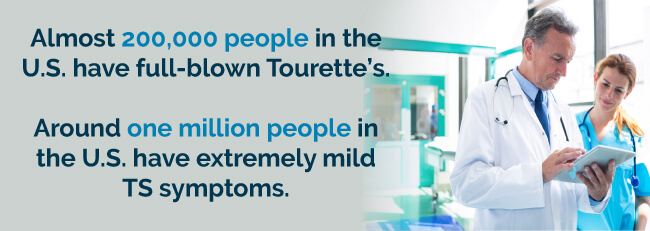
When you’re struggling with Tourette syndrome, also called Tourette’s or simply TS, you may be delighted to find out there’s another treatment just around the corner — medical marijuana. Although medical weed helps with some neurological conditions, you can now add medical cannabis for Tourette syndrome to the ever-growing list.
While no one test that can tell doctors if a person has Tourette syndrome, tests like computed tomography (CT), magnetic resonance imaging (MRI), blood tests and electroencephalogram (EEG) can help doctors rule out other conditions that could have similar symptoms as TS. It’s when these tests come back negative for other conditions, and the individual has had chronic, multiple vocal or motor tics for more than a year that the doctor will make an official, clinical diagnosis of Tourette syndrome.
As mentioned, medical weed is effective in treating a number of neurological conditions, and it may assist in treating debilitating tics, behavioral symptoms and other symptoms of TS.

A study published in the Journal of Neuropsychiatry and Clinical Neuroscience and carried out by the University of Toronto discovered marijuana quiets tics in Tourette syndrome patients. Another report, published in Behavioural Neurology, concludes experts recommend THC for the treatment of Tourette syndrome in adults when other first-line treatments did not result in an improvement in tics. Treatment-resistant adult patients should consider THC therapy.
Because of the calming effects of certain strains of marijuana, medical cannabis can help people with obsessiveness, anger, irritability, sleeplessness and anxiety curtail these symptoms. Stigma surrounds both tics involved in Tourette syndrome and marijuana usage, including using cannabis for medical purposes. Medical marijuana may mildly relieve tics, but no evidence to date suggests cannabis will exacerbate them. Research also concludes there is no adverse effect for THC in TS patients.
Currently, Arkansas, Illinois, Minnesota and Ohio have approved Tourette syndrome as a qualifying condition for the treatment of Tourette syndrome. Additional research needs to be conducted into the treatment of medical marijuana for Tourette syndrome so physicians can tailor doses and medication to the individual. For people whose current medications or treatment modalities prove insufficient, medical marijuana may be the treatment of choice, particularly if one of the non-psychoactive components of cannabis is discovered to help. This would also enable children to take it with no cognitive side effects.
Find A Doctor Find A Dispensary
Marijuana for Tourette syndrome can treat symptoms such as:

Researchers believe marijuana reduces tics in similar ways as it does Parkinson’s and other dystonia-inducing conditions. Although it’s not clear as to how, experts think that it may have something to do with the densely clustered cannabinoid receptors in the hippocampus and basal ganglia parts of your brain that control of movement and behavior.
Some helpful cannabis and Tourette syndrome strains include:
There are a variety of methods you can try with your marijuana and Tourette syndrome treatment. Some include:
If you’re considering trying cannabis for Tourette syndrome, search for a medical marijuana doctor or dispensary. You don’t have to struggle with the debilitating tics and other symptoms associated with Tourette syndrome.
Find A Doctor Find A Dispensary
Tourette syndrome is a type of neurological disorder characterized by stereotyped, repetitive, involuntary vocalizations and movements known as tics. For example, you may repeatedly shrug your shoulders, blink your eyes or blurt out offensive words or unusual sounds when you have Tourette’s.
Your tics can be mild to severe. If you struggle with severe tics, they could interfere with daily functioning, communication and your quality of life significantly.
The types of tic include:
Tics also include sounds, i.e. vocal tics, and movement, i.e. motor tics. However, motor tics typically start before vocal tics, but people experience the spectrum of tics differently.
Tics tend to show up in children and adolescents between the ages of two and 15, and three-quarters display them by age 11. Males are about three to four times more likely to develop Tourette’s than females.

Even though Tourette syndrome doesn’t have a cure, you can find treatment options. Many people who have TS don’t require treatment when their symptoms are only mild. And tics often become controlled or lessen after the teenage years.
In 1825, French neurologist Jean-Marc Itard provided the first written descriptions of Tourette syndrome. Itard was taking care of a noblewoman who had vocal tics when she was seven years of age. Her tics eventually developed into curses and screams, which resulted in her having to live in seclusion.
Sixty years after Itard supplied this description, Georges Albert Edouard Brutus Gilles de la Tourette, a neuropsychiatrist and namesake for the condition, wrote an exhaustive report on a few patients with tics. He included the French noblewoman Itard studied in this report.
Tics represent the primary symptoms of TS, with numerous motor tics and a minimum of one vocal tic. Motor tics examples include:
Vocal tic examples include:
Among the most disabling and dramatic tics include motor movements that result in self-harm activities, such as banging your head or punching yourself in the face.
Vocal tics like repeating the phrases or words of others, called echolalia, or uttering words, like swearing, result in socially inappropriate, or coprolalia, behaviors. Only around 15 percent of people with TS experience coprolalia. Some people have premonitory urges — sensations or urges in the muscle group affected — before their tics.
Some with Tourette syndrome will say you have to complete a tic a specific number of times or in a particular manner to decrease the urge or sensation. Your tics can get more severe, last longer or happen more often in certain situations, such as when you’re under stress. Your type of tic may even change altogether.
Anxiety or excitement tends to worsen tics, whereas remaining calm or performing focused activities seems to make them better. In some cases, people can suppress their tics for a little while. However, the tension begins building, and they eventually have to release the tic. And if the person is trying hard to control the tic, it can get difficult to focus on other things.
Tight collars or other physical experiences can trigger your tics or make them worse. When other people clear their throat or sniff, these actions can trigger you to make similar sounds. Tics don’t go away while you sleep but do tend to diminish significantly.
TS can include some behavioral and psychological problems. It can also include learning disabilities. But TS doesn’t typically affect the intelligence of a person. Other effects of TS include the following.
Around 50 percent of kids with TS will also develop Obsessive Compulsive Disorder (OCD). Compulsive behavior and obsessive thoughts characterize this mental health condition.
In children with Tourette’s, the OCD symptoms usually look like this:
ADHD is another common disorder kids with TS often get. In fact, it’s thought that ADHD affects up to half of the children with TS.
As a behavior disorder, attention deficit hyperactivity disorder causes problems with impulse control, attention span, the ability to plan and concentration. Kids with TS and ADHD typically have a harder time focusing on tasks for long periods and get distracted easily.
Children with TS can also develop other behavioral problems, such as:
As a child gets older, their inappropriate behavior can often turn into them acting in a sexually aggressive way or saying inappropriate sexual remarks. Once a child begins treatment, however, these types of issues usually improve.
TS doesn’t usually affect your intelligence, but it can lead to problems in learning, especially in a person with ADHD or OCD. Often individuals with TS find it difficult to learn through habit, such as a child learning to read. The part of their brain that is in control of learning habits is the basal ganglia, and this is the part that’s most associated with TS.
Kids with TS may have problems with certain activities and mastering skills other children pick up as a matter of routine, like writing, reading and adding or subtracting numbers. Some children with Tourette’s may need extra specialized educational support.
The Centers for Disease Control and Prevention (CDC) have compiled these statistics involving Tourette syndrome:

The University of Washington reports these facts about Tourette syndrome:
Often tics don’t require treatment because they’re mild. If your tics become problematic, your doctor will likely prescribe you a medication to help alleviate them. It may take several tries to get the right dosage that will assist with your tics, so work closely with your doctor to avoid side effects.
Medications for Tourette syndrome can include the following.
Haloperidol treats uncontrolled outbursts of sounds, words and movements related to TS. It also helps to treat behavior problems in children who are hyperactive when other medications or treatments haven’t worked. Side effects of Haloperidol include:
A part of the phenothiazine class of medications, the neuroleptic Fluphenazine medication works by affecting the balance of your neurotransmitters in your brain. It controls tics by working with dopamine, a brain chemical. Side effects of Fluphenazine include:
Pimozide helps to reduce uncontrolled motor tics or vocal tics that TS causes. It decreases the activity of dopamine in your brain. Side effects of Pimozide include:
These are high blood pressure medications doctors prescribe to treat tics. Healthcare experts deem clonidine and guanfacine as reasonably safe for treating moderate tics. Side effects of Clonidine and Guanfacine include:
Paroxetine (Paxil), sertraline (Zoloft), fluoxetine (Prozac) and other antidepressants help with sadness, anxiety and obsessive-compulsive symptoms. Side effects of antidepressants include:
In addition to medication, your doctor may suggest talk therapy. A counselor or psychologist can help you with your social issues your tics and other symptoms cause. Behavior therapy can also help. One type of therapy, in particular, known as habit-reversal training, teaches you to recognize your tic is coming so you can move in a manner that stops it.


Please allow us to access your location to find local dispensaries.
VIEW ALL DISPENSARIES ➔